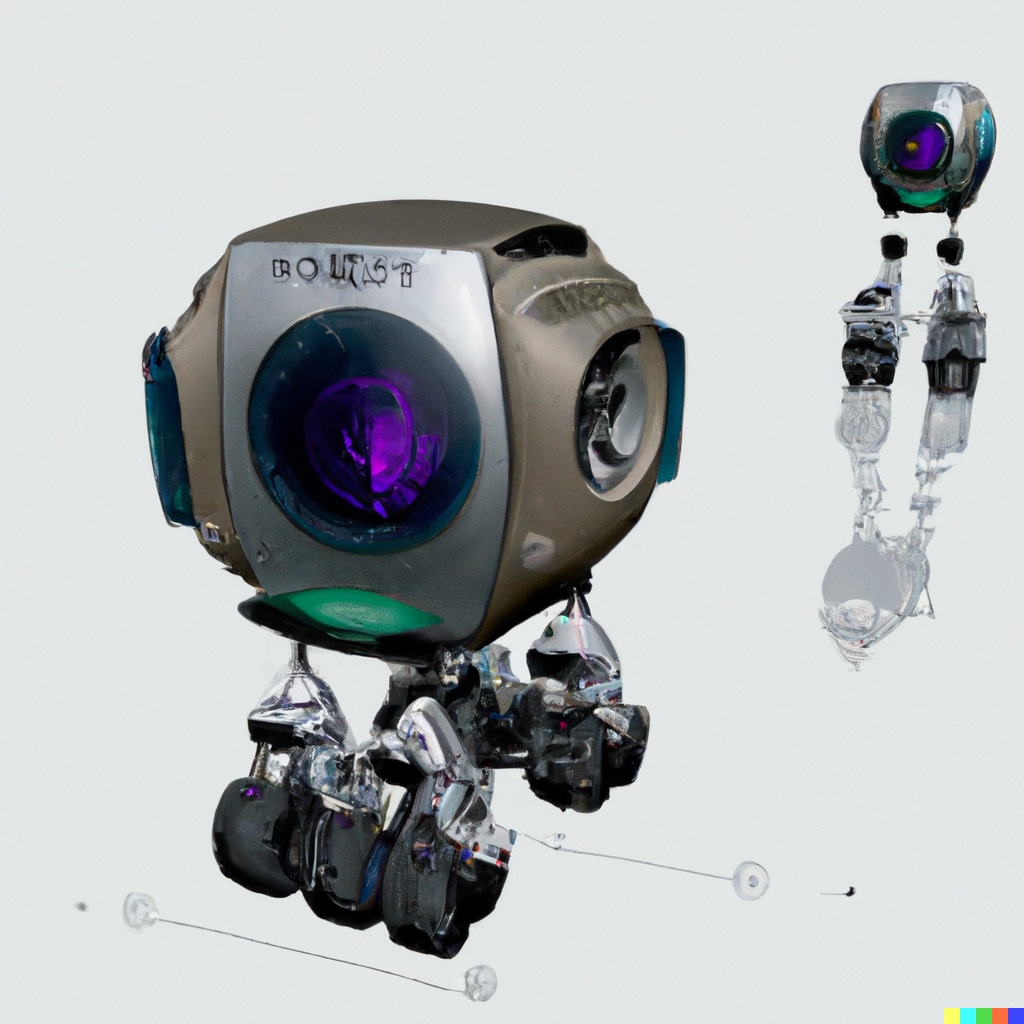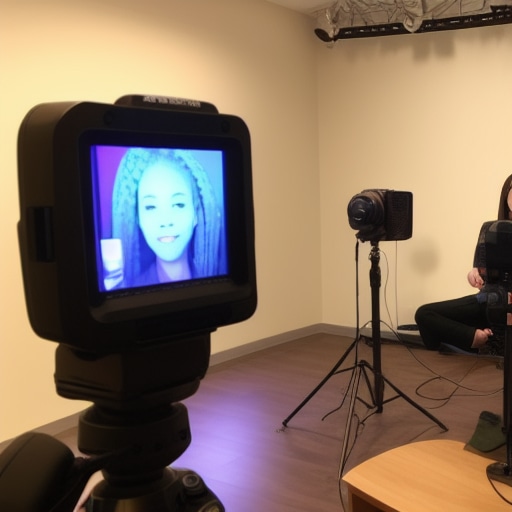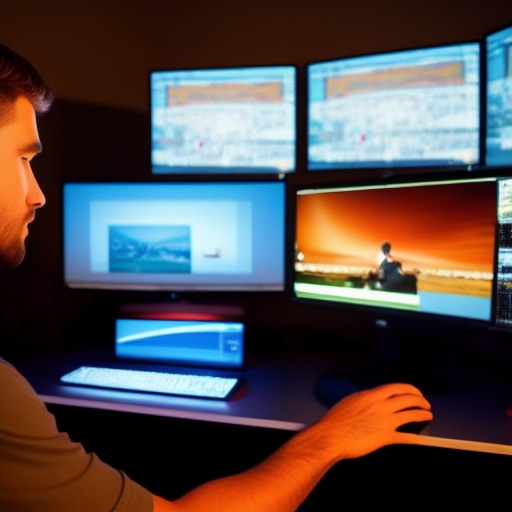
Home » Productivity »
Artificial intelligence (AI) is making significant strides in the field of video creation, with the ability to assist in tasks such as editing, color correction, and even the creation of original content. AI-powered tools can analyze footage and automatically identify and select the most visually appealing shots, as well as suggest edits and transitions to create a more polished final product. Additionally, AI can be used to generate original video content, such as animations and visual effects, allowing creators to produce more complex and dynamic videos with less time and effort. As AI technology continues to advance, it is likely that it will play an increasingly important role in the video creation process, streamlining workflows and enabling the creation of more sophisticated and engaging content.

Artificial intelligence (AI) is being used to automate the process of color correction in video production. AI algorithms can analyze footage and automatically adjust the color balance, exposure, and other parameters to achieve a desired look or match a specific color palette. This can save time and effort for video editors, who no longer need to manually adjust these settings frame by frame.
AI-powered color correction tools can also be used to automatically identify and fix color issues in footage, such as incorrect white balance or color casts. This can be especially useful for large projects with a large volume of footage, as it can help to ensure that the final product has a consistent and cohesive look.
In addition to automating the color correction process, AI can also be used to generate new color grades and styles for footage. This can enable video creators to experiment with different looks and styles, and can help to bring a fresh and creative approach to color grading.
Overall, AI is likely to have a significant impact on the way that color correction is approached in video production, making the process more efficient and enabling the creation of more sophisticated and visually striking content.
The use of artificial intelligence (AI) in video editing has the potential to significantly impact the role of editors in the film and video industry. AI-powered tools can assist with tasks such as selecting and organizing shots, suggesting edits and transitions, and even generating original content. This can help to streamline the editing process and make it more efficient, allowing editors to focus on more creative and high-level tasks.
However, it is important to note that AI is not currently capable of fully replacing the role of a human editor. While AI can assist with certain tasks, it still requires human oversight and judgement to ensure that the final product meets the desired creative vision and standards.

As such, it is likely that the role of the editor will evolve in response to the increasing use of AI in video production. Editors may need to adapt their skills and knowledge to work alongside AI tools and incorporate them into their workflow. They may also need to be more proactive in shaping the creative direction of a project, as AI can handle many of the more technical aspects of the editing process.
Ultimately, the impact of AI on the role of editors will depend on the specific tools and techniques being used, as well as the preferences and needs of the individuals and organizations involved.
It is unlikely that the use of artificial intelligence (AI) in video production will have a significant impact on actors and their roles. While AI can be used to generate original content and assist with tasks such as editing and special effects, it is not currently capable of fully replacing the need for human actors.
AI can be used to create digital characters or avatars, but these are typically based on pre-existing models and do not have the same level of flexibility or range of expression as human actors. Therefore, actors will continue to be an essential part of the film and video industry, bringing their unique talents, skills, and creativity to the table.
That being said, it is possible that the use of AI could change the way that actors are cast or hired for certain roles. For example, AI might be used to analyze the characteristics and performances of different actors and suggest those that are most suitable for a particular role or project. However, this would likely only be one factor among many in the casting process, and the final decision would still be made by human producers and casting directors.
Overall, while AI has the potential to revolutionize many aspects of video production, it is unlikely to have a significant impact on the role of actors in the industry.
Artificial intelligence (AI) has the potential to significantly enhance the viewing experience of live sports events. AI can be used to analyze and interpret large amounts of data in real-time, providing insights and analysis that can help to enhance the understanding and enjoyment of the game for viewers.
For example, AI can be used to track the movements of players and the ball on the field, providing metrics such as speed, distance covered, and passing accuracy. This information can be used to generate interactive graphics and overlays that provide viewers with a deeper understanding of the strategies and tactics being employed by teams.
AI can also be used to analyze the performance of individual players and teams, providing insights into their strengths and weaknesses, and highlighting key moments and plays. This can help to create a more immersive and engaging viewing experience, as viewers can get a deeper understanding of the strategies and techniques being used by players.
In addition, AI can be used to generate real-time highlights and replays, allowing viewers to easily access and review key moments from the game. This can be especially useful for those who are unable to watch the game live, or who want to review specific plays or moments in more detail.
Overall, the use of AI in live sports has the potential to provide a more engaging and immersive viewing experience, helping to enhance the understanding and enjoyment of the game for fans.
It is possible that the use of artificial intelligence (AI) in sports broadcasting could impact the role of the instant replay team. AI can be used to analyze and interpret large amounts of data in real-time, including footage of sports games, and generate real-time highlights and replays. This can potentially reduce the need for human instant replay operators to manually review and edit footage to create highlights packages.
However, it is important to note that AI is not currently capable of fully replacing the role of human instant replay operators. While AI can assist with certain tasks, it still requires human oversight and judgement to ensure that the final product meets the desired creative vision and standards. Additionally, AI may not be able to identify and highlight all of the key moments and plays in a game, and may require human review and input to ensure that all relevant footage is included in the highlights package.

As such, it is likely that the role of the instant replay team will evolve in response to the increasing use of AI in sports broadcasting. Members of the team may need to adapt their skills and knowledge to work alongside AI tools and incorporate them into their workflow. They may also need to be more proactive in shaping the creative direction of the highlights package, as AI can handle many of the more technical aspects of the process.
Ultimately, the impact of AI on the role of the instant replay team will depend on the specific tools and techniques being used, as well as the preferences and needs of the individuals and organizations involved.
It is possible that the use of artificial intelligence (AI) and machine learning could impact the role of camera operators in the film and video industry. AI and machine learning algorithms can be used to analyze and interpret large amounts of data, including footage from cameras, and make decisions based on that data. This could potentially be used to automate certain tasks that are currently performed by camera operators, such as framing shots, adjusting focus and exposure, and tracking moving subjects.
However, it is important to note that AI and machine learning are not currently capable of fully replacing the role of a human camera operator. While AI and machine learning can assist with certain tasks, they still require human oversight and judgement to ensure that the final product meets the desired creative vision and standards. Additionally, AI and machine learning may not be able to fully capture the nuances and subtleties of human performance, and may require human input to ensure that the footage is captured in a way that effectively conveys the desired mood or emotion.
As such, it is likely that the role of the camera operator will evolve in response to the increasing use of AI and machine learning in the film and video industry. Camera operators may need to adapt their skills and knowledge to work alongside AI and machine learning tools and incorporate them into their workflow. They may also need to be more proactive in shaping the creative direction of a project, as AI and machine learning can handle many of the more technical aspects of the filming process.
Overall, the impact of AI and machine learning on the role of camera operators will depend on the specific tools and techniques being used, as well as the preferences and needs of the individuals and organizations involved.
It is difficult to predict with certainty how the use of artificial intelligence (AI) and machine learning will impact the salaries of human workers in the film and video industry. The impact will depend on a variety of factors, including the specific tasks and roles that are being automated, the extent to which AI and machine learning are used, and the overall demand for human workers in the industry.
In some cases, the use of AI and machine learning may lead to an increase in efficiency and productivity, which could potentially lead to higher salaries for human workers. For example, if AI and machine learning are used to automate certain tasks that are currently time-consuming or repetitive, human workers may be able to focus on more complex and higher-value tasks, potentially leading to higher salaries.
On the other hand, the use of AI and machine learning could also potentially lead to a reduction in demand for certain types of human workers. For example, if AI and machine learning are used to automate tasks that are currently performed by camera operators, editors, or instant replay operators, there may be fewer job opportunities available in these roles. In such cases, salaries for human workers in these roles could potentially be impacted.
Ultimately, the impact of AI and machine learning on salaries will depend on the specific tasks and roles being automated, as well as the overall demand for human workers in the industry. It is important for individuals to stay up-to-date with the latest developments in AI and machine learning, and to continually develop their skills and knowledge in order to remain competitive in the job market.
There are several other ways in which artificial intelligence (AI) could potentially impact the video market in the future:
Overall, the impact of AI on the video market is likely to be significant, as it has the potential to enhance the viewing experience, increase accessibility, improve production efficiency, and open up new creative possibilities.